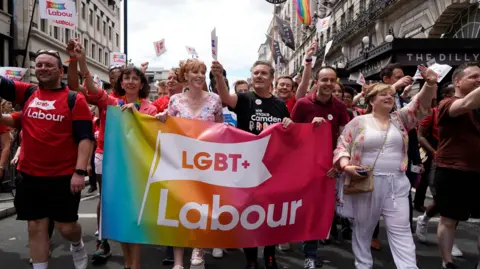In a significant recent development within the UK’s LGBTQ+ community, four of the country’s most prominent Pride organizations—Birmingham, Brighton, London, and Manchester Prides—have announced the suspension of political parties’ participation in their events. This decision comes as an explicit expression of solidarity with the transgender community, emphasizing their commitment to protecting and advocating for trans rights in light of recent legal changes.
The statement reflects a growing concern among Pride organizers regarding the treatment of LGBTQ+ rights, particularly for transgender individuals. The decision to bar political representations was not made lightly; it follows a ruling by the Supreme Court which defined “woman” within the context of the Equality Act strictly by biological sex. This ruling has generated considerable controversy, dividing activists and LGBTQ+ allies into factions—some applauding it as a means to safeguard spaces for biological women, while others fear it exacerbates the vulnerability of transgender individuals.
The organizers articulated their apprehension about a “disturbing global trend” in which LGBTQ+ rights are regressing, insisting that the UK should lead in matters of human rights and not regress. By suspending political party involvement, they aim to spotlight the pressing need for a commitment to trans rights and demand that political figures demonstrate a substantial and proactive stance towards inclusion and equality.
Furthermore, the Supreme Court’s ruling has prompted organizations, including the Equality and Human Rights Commission (EHRC), to update guidance reflecting that biological sex takes precedence in the context of single-sex services. This development raises imperative questions about access to spaces such as bathrooms and changing facilities and how these changes might impact transgender and non-binary individuals seeking to fit into societal molds. The EHRC clarified that a trans woman is legally viewed as a biological man, and similarly, a trans man as a biological woman regarding the Equality Act, sparking further debates about inclusivity and respect for transgender identities.
The response to the ruling has not been uniformly supportive; directorate members of various LGBTQ+ groups have expressed feelings of betrayal. They feel that Pride events, which traditionally celebrate inclusivity and diversity, have suddenly narrowed the focus to a more biologically centered definition of gender, leaving many feeling abandoned. For example, Scottish Lesbians, a grassroots group concerned about preserving the rights of same-sex attracted women, expressed relief about their legal protections but disappointment regarding the current trajectory of Pride festivities.
Political parties have frequently utilized Pride events as platforms to express support for LGBTQ+ rights, with prominent figures in the UK including Sir Keir Starmer, the current Leader of the Labour Party, who have actively participated in marches. The suspension of political parties, therefore, signifies a profound shift in the landscape of Pride events—a contradiction of the traditional alliance between LGBTQ+ organizations and political entities.
However, reactions to this decision have been mixed. While some groups, like the LGBT+ wing of the Liberal Democrats, voiced frustration over being “lumped in” with parties perceived as having general hostility towards LGBTQ+ communities, the Pride organizers remain firm in their decision. They call for better protection against discrimination for trans individuals and emphasize their demand for a more sustainable and supportive environment for trans-led services.
As the discourse around gender identity and rights continues to evolve, the decision to suspend political party involvement may signal a pivotal turning point for the future of Pride events in the UK—one that prioritizes the voices of transgender individuals and seeks to ensure their rights and dignity are upheld within the broader struggle for equality. This action begs the question of how political organizations will respond to the concerns raised by grassroots groups, particularly in fostering an environment where every segment of the LGBTQ+ community feels represented and valued. The upcoming Pride seasons will undoubtedly test this newfound commitment amidst a backdrop of legal, political, and social contention surrounding LGBTQ+ rights in Britain and beyond.



